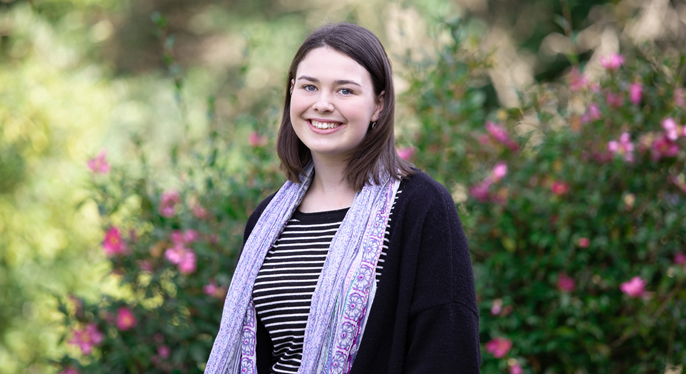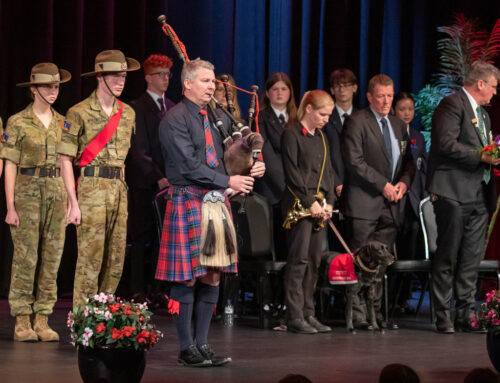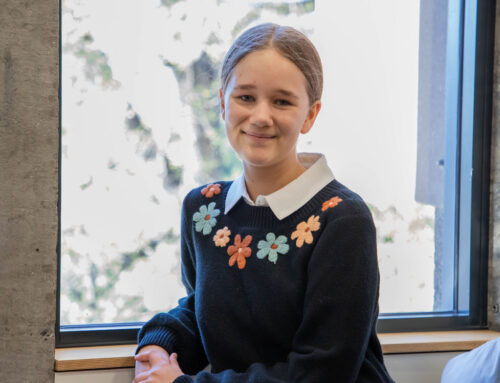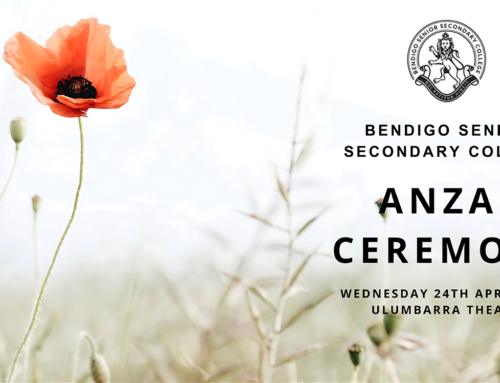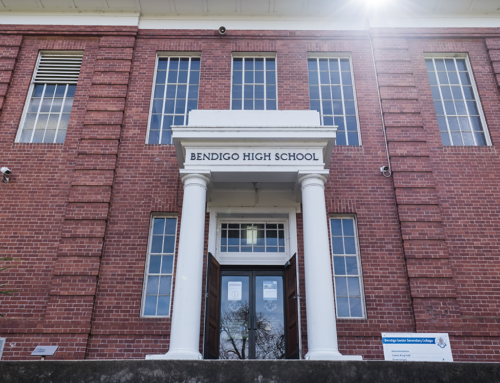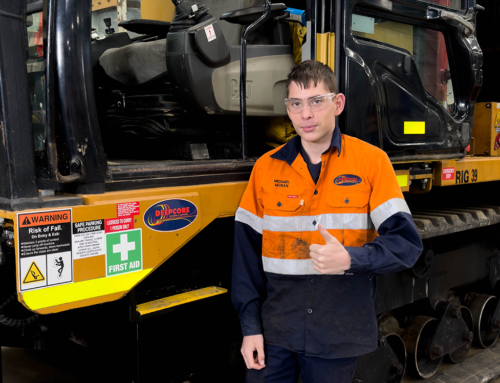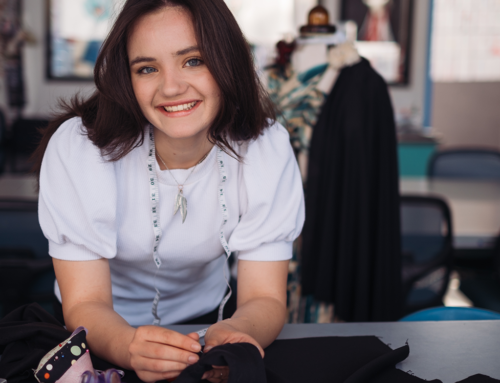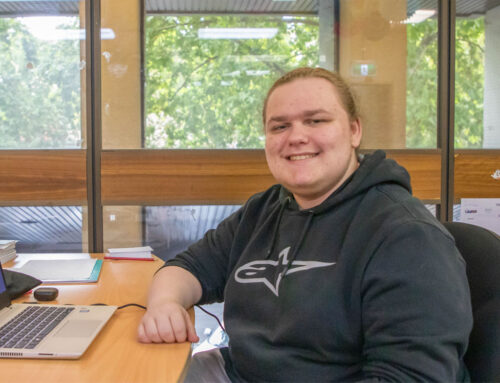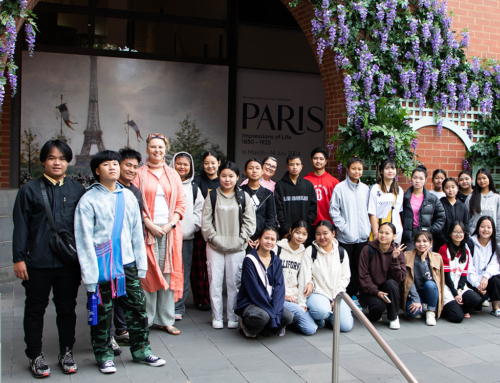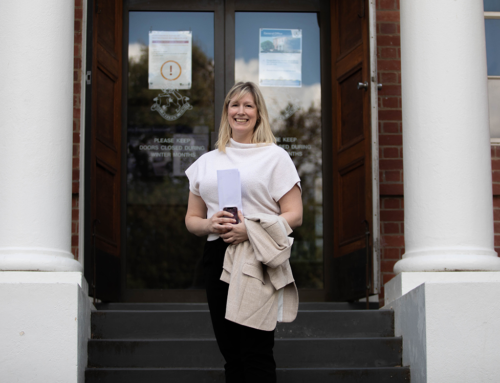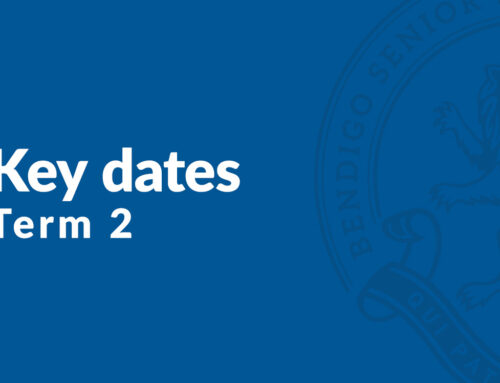If BSSC Year 12 student, Emily Gundry, could travel through time and offer her twelve-year-old self some advice, it would be:
“Listen to what your family is telling you… get out there! Don’t let your natural shyness stop you from opening up to the world. There’s nothing to lose and so much to gain—including becoming a better version of yourself.”
It was through being ‘dobbed in’ by her older sister, while still in Year 7, that Emily discovered leadership was a pathway to increased personal confidence.
By the time she was in Year 9, she had embraced both her family’s advice and the opportunities that opened up to her.
“It wasn’t as simple as no longer being shy,” she says. “It was more that I learnt how to reach out despite it.”
Popular with her peers and perceived by her teachers to be super-reliable, Emily was given, and took on, more and more responsibility. She was also a dedicated and hard-working student. However, she began to suffer from the high expectations that weighed on her.
“In Year 10 I was a year level leader, but I could feel myself getting ‘burnt out’ by all the extra-curricular activities,” Emily says.
With VCE looming she decided she needed to be somewhere else—a place where she wouldn’t have the same level of expectation. Colleges nearby in Melbourne were not an option, as ‘poaching’ was seen as poor form.
Some of Emily’s extended family live in Bendigo so she decided to take a look at BSSC. Online she found an array of subjects she loved and a college that was positive about all pathways—“not just sport or STEM”.
“The first time I visited BSSC I was sitting in Student Services waiting for a tour of the college,” Emily remembers. “I couldn’t believe how happy all the students looked… it just wasn’t like that in Melbourne. I wanted some of that.”
Emily arrived “flying solo” at the start of Year 11 and her natural shyness made the new beginning really daunting.
She knew what to do, however, and pushed herself to make tentative steps to connect with her classmates. She was rewarded with friendships and connections that have made her time at the college so much more special.
She’s also fallen in love with Bendigo.
“In comparison to Melbourne, Bendigo feels like a big family and people are so nice,” she says. “At first I wasn’t sure it was for real.”
Emily doesn’t have a favourite subject and has been “just rapt” with all her teachers.
“I often rave about my English teacher, David Van Es,” she admits. “He not only asks us about our school work, but is always really concerned about how students are coping personally. That means a lot.”
So what is Emily’s hot study tip?
“Just keep going!” she says. “Do your work. Exercise. Get up early to watch the sunrise. Try colouring—it stops my mind buzzing. And remember: you will be alright in the end.”
Emily believes everyone should work out a plan that works for them and then stick to it for three weeks.
“That will embed it as habit,” she says.
She laughs when asked about her study habits.
“I get up at 5:30am and arrive at school, with a coffee, by eight,” she says. “By the time I go to my first class I have 40 minutes of homework already done. And I always come in—even if I have a free first period.
“When I get home I have about an hour off and then I do some work and I watch one of the reality shows at 7.30pm. I work part-time at Coffee Co. on weekends.”
Emily’s approach to her studies has already paid big dividends. She is on-track to study Anthropology and International Studies having gained an early acceptance into La Trobe University through the ‘Aspire’ program.
She hopes to study in Bendigo, but is also open to the possibility that once she gets her teeth into her studies, completely new options or pathways may become apparent.
“As long as I’m heading towards something where I can help people on a large scale I’ll be happy,” Emily says.
She believes the top three global issues are women’s rights, racial equality and social justice. While she is also very concerned about Climate Change, because she is not a science student, Emily feels it will not be her major area of influence in the future.
And though she moved to Bendigo to rid herself of leadership responsibilities, Emily is now a committed member of Vic Student Representative Council and Chair of their Advisory Committee.
“I really enjoy the responsibility we have to speak on behalf of around one million Victorian students,” Emily explains. “I’m aware of the weight of our role, but it’s so great to be able to put student concerns and opinions to the Minister of Education and other Ministers in the Victorian Government.”
Her own early experiences as a leader have given Emily the opportunity to reflect on the attributes of a good leader.
“I feel there’s a problem at the moment with some of our leaders presenting as though they have the whole community’s best interests at heart, but then not following through,” she says. “It’s sad, but all we can do is vote for who we think will do the least worst damage.”
Asked for her assessment of those who have led Australia through the pandemic, Emily has admired Scott Morrison’s approach, but her hero is Jacinda Adern.
“I wish we had her here! She really knows what she’s doing and I see her as such an icon.”
During the first COVID-19 lockdown, Emily was interviewed by ABC News and spoke eloquently about the concerns of students.
“I think they probably wanted some heartfelt personal comment, but I knew I needed to speak for as many of the state’s students as I could,” she explains. “When they asked me specifically about VCE I felt I could speak more personally.”
In fact her experience of the first lockdown shocked her.
“I did really well for the first couple of weeks and then I seemed to crash,” she says. “I’m usually quite diligent, but I ended up finding it really hard—what must it have been like for those who were already at risk of disengaging?”
Emily was incredibly happy to be back at school, but now, along with most Victorian students, faces another period of remote learning—no doubt wiser and better prepared but conscious of how easily everything can fall apart.
“This time around I’m planning not to crash out so miserably!” Emily says wryly.
Her plan to achieve this includes sticking very closely to a routine of schoolwork and breaks.
“I’ve decided I’m also going to prioritise my mental health over academic achievement,” she says. “If I need a break I will take it.”
Emily also has a message for all her BSSC peers.
“Just keep your head and remember we really are all in this together and help is easily available.”

